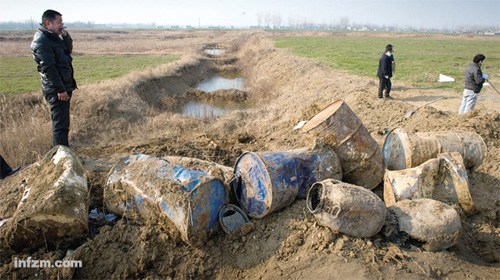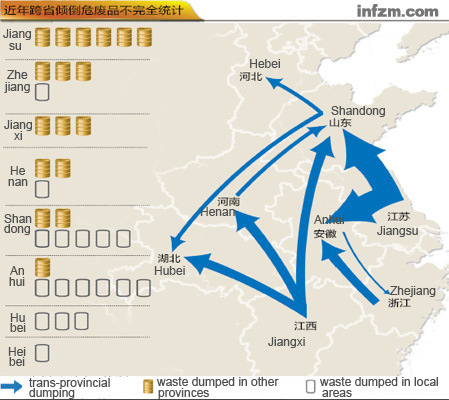
The villagers discovered the malodorous chemical waste in Xinxian Township, Anhui Province in early February.

Report on trans-provincial dumping of hazardous waste.
(Ecns.cn)--Heavily polluting industries in China have become cannier by dumping hazardous waste in remote areas of other provinces, taking advantage of serious defects in the way disposal of toxic waste is regulated, reports the Southern Weekend.
Punishment for illegal dumping is not severe enough and supervision of waste treatment is far from adequate, says the newspaper.
Wang Min, a farmer in Xinxian Township of Anhui Province, was arrested earlier this month for pouring over 70 buckets of chemical waste into an abandoned brick kiln late last year.
The nearby villagers discovered the malodorous black liquid four months later and reported it to local police, who captured six suspects soon after.
According to an inspector, the culprits are mostly local farmers who are "hateful, yet pathetic," since they are ignorant of the law and unaware of the risks they are taking.
Worse still, the villagers usually treasure the profitable toxic waste, and even keep the containers after disposing of the effluence.
"Some of them don't even know how to spell their names," the inspector says.
But "this is just the tip of the iceberg," comments the Southern Weekend, citing statistics from the Anhui Bureau of Environmental Supervision that claim the province has cracked ten illegal dumping cases in the last three years.
"Every time we wrap up a case, we try to investigate other hidden dangers. However, the dumping sites are usually in remote areas, making it hard for us to find clues," Liu Yan, an official from the bureau, explains.
"In fact, all of the ten cases were solved based on tip-offs from villagers," adds Liu.
Moreover, dumping is a business where a small investment can bring a ten thousand-fold profit, making it attractive to many poor and jobless people across the country.
In 2011, over 5,000 tons of chromium residue were illegally dumped in Qujing, Yunnan Province, polluting more than 9,000 tons of soil and raising widespread concern.
In response, Zhang Lijun, vice minister of environmental protection, held a national teleconference, stressing that the practice had an "extremely bad environmental impact."
"Efforts should be made to curb the rising amount of pollution caused by hazardous waste," said Zhang, adding that the waste has "seriously threatened environmental safety and damaged people's health."
Measures preventing such incidents include strictly examining and approving new projects as well as paying special attention to new projects that involve the utilization or disposal of hazardous waste, the state-run Xinhua News Agency quoted Zhang as saying.
He added that companies running businesses involving hazardous waste should publish annual environmental reports so that they can receive media and public supervision, and harsher penalties should be imposed on companies polluting the environment. Violators should also be required to clean up soil and tainted underground water.
Currently, Zhang pointed out, irregularities in stockpiles, landfills and random dumps of hazardous waste have become a major source of soil and water pollution, yet capabilities for treating and utilizing this waste "far from meet requirements."
By February 13, more than half of all the official websites of 31 provinces had not yet released adequate information on hazardous waste.
Accurate data on the problem is always hard to come by. For example, the National Census of Pollution Sources in 2007 reported 45.74 million tons of waste, three times higher than the figure (10.79 million tons) claimed in the Annual Statistic Report on the Environment of China.
Yuan Bu, director of the Anhui Solid Waste Management Center, revealed that the former report corresponded more closely to reality.
Data from the Ministry of Environmental Protection show that as of 2010, only 8 million tons of hazardous waste had been disposed of, accounting for a mere 20 percent of the total.
"The costs of running a waste disposal company are quite high," explained a manager at Chaoyue Xinxing Waste Management Co. Ltd. "As a private company, we can only make modest profits。"
An industry insider pointed out that competition in the waste management market is fierce, generating a large number of small private companies mainly focused on disposing certain types of waste.
"However, poor management and accounting at those companies causes supervision loopholes," he said.
In response, Zhang Lijun noted that treating hazardous waste will become a priority in China's pollution prevention work over the next five years.
Under his appeal, a national campaign was launched in 2011 to inspect the chromium salt and polysilicon industries and the hazardous waste treatment facility sector, as well as sludge from sewage treatment plants and electronic waste.

Copyright ©1999-2011 Chinanews.com. All rights reserved.
Reproduction in whole or in part without permission is prohibited.